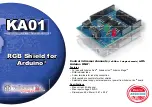
System Control Registers
428
SLAU723A – October 2017 – Revised October 2018
Copyright © 2017–2018, Texas Instruments Incorporated
System Control
4.2.162 PCPWM Register (Offset = 0x940) [reset = 0x1]
Pulse Width Modulator Power Control (PCPWM)
register type RW, reset 0x00000001
NOTE:
The PWM module does not currently provide the ability to respond to the power-down
request. Setting a bit in this register has no effect on power consumption. This register is
defined for future software compatibility.
The PCPWM register controls the power applied to the PWM module. The function of this bit depends on
the current state of the device (run, sleep or deep-sleep mode) and value of the corresponding bits in the
RCGCPWM, SCGCPWM, and DCGCPWM registers. If the Rn, Sn, or Dn bit of the respective
RCGCPWM, SCGCPWM, and DCGCPWM registers is 1 and the device is in that mode, the module is
powered and receives a clock regardless of what the corresponding Pn bit in the PCPWM register is.
However, if the Rn, Sn, or Dn bit of the respective RCGCPWM, SCGCPWM, and DCGCPWM registers is
0 and the device is in that mode, then the module behaves differently depending on the value of the
corresponding Pn bit in the PCPWM register. In this case, when the Pn bit is clear, the module is not
powered and does not receive a clock. If the Pn bit is set, the module is powered but does not receive a
clock.
lists the differences.
Table 4-189. Module Power Control
Rn, Sn, or Dn
Value in
Respective
RCGCx,
SCGCx, or
DCGCx
Register
Pn
Description
0
0
Module is not powered and does not receive a clock. In this case, the state of the peripheral
is not retained.
This is the lowest power consumption state of any peripheral, because it consumes no
dynamic nor leakage current. Hardware should perform a peripheral reset if the active mode
changes and the RCGCx, SCGCx, or DCGCx register is 1 or the P0 bit is changed to 1.
Software must reinitialize the peripheral when reenabled due to the loss of state.
0
1
Module is powered but does not receive a clock.
In this case, the peripheral is inactive. This is the second-lowest power consumption of any
peripheral, because it consumes only leakage current.
1
X
Module is powered and receives a clock.
PCPWM is shown in
and described in
Return to
Figure 4-168. PCPWM Register
31
30
29
28
27
26
25
24
23
22
21
20
19
18
17
16
RESERVED
R-0x0
15
14
13
12
11
10
9
8
7
6
5
4
3
2
1
0
RESERVED
P0
R-0x0
R/W-
0x1
















































